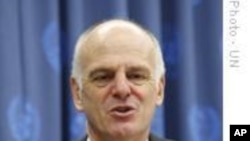The World Health Organization is working on a scheme to make H1N1 Swine
Flu vaccines available to poor countries. WHO has just completed a
survey of more than 60 developing countries to learn from them how best
to help them prepare for the H1N1 pandemic.
For now, the H1N1 swine
flu pandemic is relatively mild. But, the World Health Organization
warns it might become more severe. It says countries must be prepared
for the possibility that the virus will mutate becoming more virulent.
Assistant
U.N. Secretary-General and U.N. Coordinator on Avian and Pandemic
Influenza, David Nabarro says the pandemic could last two years, so
nations must be prepared for the long haul.
He says U.N.
agencies are working on a plan to support developing countries get the
help they need to protect their populations from the pandemic. He says
the plan is based on the priorities expressed by the countries
themselves.
He says the plan aims to prevent excess mortality,
keep the negative social impact from the disease to a minimum and make
health systems stronger so countries can protect themselves from the
current and future pandemics.
He says poor countries want access
to H1N1 vaccines and anti-virals such as Tamiflu. He says given the
shortage of the vaccine, it is necessary to establish a system that
will enable all countries to get a basic share of the available vaccine.
"There
will be a system established through which around 10 percent of world
vaccine production and anti-H1N1 vaccine production will be obtained by
WHO and made available to countries on a basis that is proportional to
their populations for them primarily to protect health care personnel
and other essential workers," said Dr. Nabarro. "And, then once that
has been set up and established, countries will be supported to do this
and also to access vaccine to help protect other high risk
individuals."
Nabarro says nine countries so far have pledged
to donate 10 percent of their stock of H1N1 vaccines to the World
Health Organization for distribution to poor countries. He says other
countries also are expected to join in.
Besides this, he says
WHO is soliciting vaccine donations from a number of pharmaceutical
companies and is prepared to buy vaccines at a low price to fill in any
gaps.
To date, WHO reportedly has received 150 million vaccine
donations from manufacturers, plus another 50 million doses from the
nine countries. The health agency says it would like to have a
stockpile of 300 million doses of the vaccine.
Dr. Nabarro says
it is difficult to know how WHO will allocate scarce supplies of
vaccine among the developing countries in a fair and equitable manner.
"The
judgment that will be made by WHO will be around a set of issues that
have to be considered," he said. "One will be what is the pandemic
doing, where is it going, who is it affecting, the kind of
epidemiological data. How ready is a country to be able to administer
the vaccine to the group that is being prioritized."
Nabarro
says countries also will have to fulfill a number of legal requirements
on liability and licensing. He notes this is the normal procedure with
any medicine and other preparation that is donated.
About 25
different manufacturers are reportedly set to donate or sell low-cost
vaccines to WHO. Health officials say each country will receive
vaccines from one specific company In order to avoid confusion and to
simplify the monitoring process.
News
Developing Countries to Get Swine Flu Vaccine

<!-- IMAGE -->





